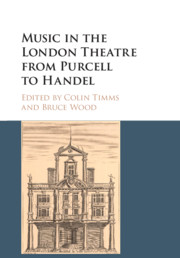Book contents
- Frontmatter
- Contents
- List of Figures
- List of Music Examples
- Notes on Contributors
- Preface
- Introduction
- I FROM PURCELL TO HANDEL
- 1 Purcell's ‘Scurvy’ Poets
- 2 Opera as Literature and the Triumph of Music
- 3 The British Enchanters and George Granville's Theory of Opera
- 4 Lost Chances: Obstacles to English Opera for Purcell and Handel
- 5 Alexander's Feast, or The Power of Perseverance: Dryden's Plan for English Opera and its Near-fulfilment in a Handel Ode
- II HANDEL AND ITALIAN OPERA
- III HANDEL AND ENGLISH WORKS IN THE THEATRE
- Bibliography
- Index
2 - Opera as Literature and the Triumph of Music
from I - FROM PURCELL TO HANDEL
Published online by Cambridge University Press: 10 June 2017
- Frontmatter
- Contents
- List of Figures
- List of Music Examples
- Notes on Contributors
- Preface
- Introduction
- I FROM PURCELL TO HANDEL
- 1 Purcell's ‘Scurvy’ Poets
- 2 Opera as Literature and the Triumph of Music
- 3 The British Enchanters and George Granville's Theory of Opera
- 4 Lost Chances: Obstacles to English Opera for Purcell and Handel
- 5 Alexander's Feast, or The Power of Perseverance: Dryden's Plan for English Opera and its Near-fulfilment in a Handel Ode
- II HANDEL AND ITALIAN OPERA
- III HANDEL AND ENGLISH WORKS IN THE THEATRE
- Bibliography
- Index
Summary
Many commentators have rightly seen dramatic opera (or ‘semi-opera’, as some persist in calling it) as primarily a literary genre. There has also been a tendency to attribute dramatic opera's separation of music from the main drama, and its confinement to certain kinds of function, to the taste of English audiences and, to a lesser extent, of dramatists. A major problem with this attribution to taste is that it tends to suppress thought. Taste, be it for certain kinds of drama, music, or beer, is a faithful and factual manifestation of preference. But invoking it as a primary agent to explain dramatic opera gives insufficient credit to the creative and opinion-shaping powers of the dramatists involved, and it gives even less credit to the seventeenth-century English stage's cultivation of a sophisticated and distinctive role for music. The writings of seventeenth-century dramatists reveal that, although they acknowledged audience tastes, they often wished to shape them. Have not great dramatists always been like that?
A good starting point for an analysis of the dramaturgical and aesthetic concepts that gave rise to dramatic opera is Thomas Shadwell's musical drama Psyche (1675), a reworking of the French tragédie-ballet of the same name (1671) that had a libretto by Molière, Corneille and Quinault and music by Lully. Shadwell's composers were Matthew Locke (1621/3–1677), who wrote the vocal music, and the Italian-born, London-resident Giovanni Battista Draghi (c. 1640–1708), who wrote most of the instrumental music.
Locke's music was published – indeed, it was the first such score of dramatic music in England. The title reads: The English Opera, or the Vocal Musick in Psyche. This work, Locke declares,
may justly wear the Title, though all the Tragedy be not in Musick: for the Author [i.e., Shadwell] prudently consider'd, that though Italy was, and is the great Academy of the World for that Science and way of Entertainment, England is not: and therefore mixt it with interlocutions, as more proper to our Genius.
The crucial phrase here is ‘proper to our Genius’, and we shall see that Locke's understanding of genius perforce incorporates a distinctive concept of taste, deeper than the dominant, thought-suppressing modern meaning (i.e., ‘preference’).
- Type
- Chapter
- Information
- Music in the London Theatre from Purcell to Handel , pp. 25 - 37Publisher: Cambridge University PressPrint publication year: 2017



